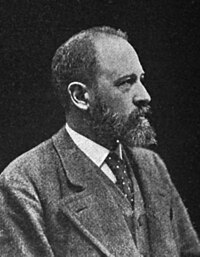Sergei Shevitch
This article or section is in a state of significant expansion or restructuring. You are welcome to assist in its construction by editing it as well. If this article or section has not been edited in several days, please remove this template. If you are the editor who added this template and you are actively editing, please be sure to replace this template with {{in use}} during the active editing session. Click on the link for template parameters to use.
This article was last edited by Carrite (talk | contribs) 11 years ago. (Update timer) |

Sergei Egorovich Shevitch (spelled variously, c. 1847-1911) (Russian: Сергей Егорович Шевич) was a Russian newspaper editor and socialist political activist who achieved his greatest fame in the United States of America. As editor of the New Yorker Volkszeitung (New York People's News) from 1879 to 1890, Shevitch emerged as arguably the most important leader of the Socialist Labor Party of America. Shevitch and his wife, the former Helene von Racowitza, returned to Russia in 1890 to avoid loss of his estate lands to the crown owing to emigration. Following several years on his estate, Shevitch emigrated again, this time to Germany, where he would die by his own hand in 1911.
Biography
Early years
Sergei E. Shevitch was born in Russia in approximately 1848.[1] Of noble birth and radical political proclivities, Shevitch attended university in Russia before emigrating to Paris.[2] It was there that he met and married the former Helene von Racowitza, over whom socialist leader Ferdinand Lassalle lost his life in a duel in 1864.[2] The pair emigrated to the United States in 1877.[1]
American period
Shortly after Shevitch's arrival in America, the socialists of New York launched a daily newspaper, the New Yorker Volkszeitung, and were in search of a professional editor.[2] The erudite Shevitch filled this role magnificently and he would remain at the helm of this leading left wing daily for more than a decade — this being, it is to be remembered, a time in which about 80% of the organized American socialist movement was German-speaking.[3] Shevitch developed fluency and oratorical skill in English as well, which he put to the test against Henry George in a memorable debate held a the Cooper Union.[2]
Return to Russia
In 1890 Shevitch and his wife returned to Russia, their decision forced by rules that would have ceded the substantial landed estate which Shevitch had inherited to the crown in the case of protracted absence from the country.[4] The pair lived on the estate for several years before successfully selling it.[5]
German period
Thereafter the couple moved to Munich.[5] Shevitch was prohibited from political participation by the German government owing to his radical views and he lived out the rest of his live in relative quiet, where he waited his time for a constitutional order to be established in his native Russia.[5]
Footnotes
- ^ a b H. Gaylord Wilshire, "The Sequel to a Modern Romance," Wilshire's Magazine, whole no. 64 (November 1903), pg. 2.
- ^ a b c d Wilshire, "The Sequel to a Modern Romance," pg. 4.
- ^ Christiane Harzig, "The Role of German Women in the German-American Working-Class Movement in Late Nineteenth-Century New York," Journal of American Ethnic History, vol. 8, no. 2 (Spring 1989), pg. 91.
- ^ Wilshire, "The Sequel to a Modern Romance," pp. 4, 6.
- ^ a b c Wilshire, "The Sequel to a Modern Romance," pg. 6.
Works
- "Russian Novels and Novelists of the Day," North American Review, vol. 128, no. 268 (March 1879), pp. 326-334. In JSTOR
